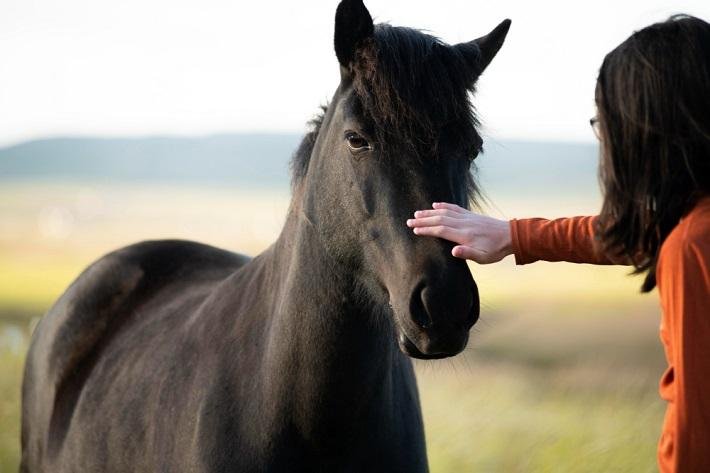Vitamin E is a crucial nutrient for horses, playing a significant role in maintaining muscle health, supporting the immune system, and providing antioxidant protection. While supplements are commonly used to ensure horses get enough vitamin E, natural food sources are often more beneficial and can be easily incorporated into a horse’s diet. In this blog, we will explore the top five foods rich in vitamin E for horses, how to include them in their diet, and the benefits of opting for natural sources over synthetic supplements.
- Alfalfa
Alfalfa is one of the richest natural sources of vitamin E for horses. It is a leguminous plant commonly used in hay and feed, providing a balanced source of nutrients including high levels of vitamin E, protein, and calcium.
Alfalfa can be fed to horses in several forms:
Alfalfa hay: This is the most common form, where dried alfalfa is baled and fed as hay. It can be mixed with other types of hay to balance the diet.
Alfalfa pellets: These are compressed alfalfa and can be used as a supplement or mixed with regular feed.
Alfalfa cubes: Similar to pellets but larger, alfalfa cubes can be soaked in water to create a mash that is easy for horses to eat and digest.
- Wheat germ oil
Wheat germ oil is extracted from the germ of the wheat kernel and is known for its high vitamin E content. It is a concentrated source of this vitamin and is easy to add to a horse’s diet.
Wheat germ oil can be fed to horses in several forms:
Add to feed: Simply pour the recommended amount over your horse’s regular feed. Start with a small amount and gradually increase to avoid digestive upset.
Mix with other oils: If your horse is already receiving other types of oils, wheat germ oil can be mixed in to boost vitamin E intake.
- Sunflower seeds
Sunflower seeds are another excellent natural source of vitamin E for horses. They are also rich in healthy fats and other nutrients beneficial to horses.
Sunflower seeds can be:
Fed whole or shelled: Horses can eat sunflower seeds either whole or with the shells removed. Whole seeds can add fiber, while shelled seeds are easier to digest.
Mixed with feed: A handful of sunflower seeds can be mixed into the horse’s regular feed as a treat or a supplement.
- Spinach
Spinach is a leafy green vegetable known for its high nutrient content, including vitamin E. While it’s not a common part of a horse’s diet, it can be fed as a treat or mixed into their regular feed.
Spinach can be:
Fed fresh: Offer fresh spinach leaves as a treat, ensuring they are clean and free from pesticides.
Mix with feed: Chop spinach leaves and mix them into your horse’s regular feed for an added nutrient boost.
- Carrots
Carrots are a popular treat for horses and are also a good source of vitamin E. They are highly palatable and can be fed in various ways.
Carrots can be:
Fed whole: Offer whole carrots as a treat, which horses can chew on easily.
Chopped or shredded: Chop or shred carrots and mix them into your horse’s regular feed for added texture and flavor.
Benefits of natural sources over supplements
While vitamin E supplements are widely available and often used to ensure horses receive adequate levels of this nutrient, there are several benefits to opting for natural food sources instead:
Bioavailability:
Natural sources of vitamin E are often more bioavailable, meaning your horse’s body can absorb and utilize the nutrient more effectively than synthetic supplements.
Nutrient synergy:
Foods rich in vitamin E also provide other essential nutrients that work together to support overall health. For instance, alfalfa not only offers vitamin E but also provides protein and electrolytes for horses such as calcium, which are crucial for muscle and bone health.
Digestive health:
Natural food sources contain fiber, which is essential for maintaining a healthy digestive system. Fiber helps regulate digestion and prevent issues such as colic and ulcers.
Palatability and variety:
Incorporating a variety of foods into a horse’s diet can improve palatability and ensure they receive a range of nutrients. Horses are more likely to enjoy their meals when they include tasty treats like carrots or sunflower seeds.
Reduced risk of over-supplementation:
Over-supplementation of vitamin E can lead to imbalances and health issues. By providing natural sources, it’s easier to control and balance the intake of vitamin E along with other nutrients, reducing the risk of over-supplementation.
Conclusion
Ensuring your horse gets enough vitamin E is essential for their health and performance. While supplements are an option, incorporating natural, vitamin E-rich foods like alfalfa, wheat germ oil, sunflower seeds, spinach, and carrots into their diet provides numerous benefits. These foods not only deliver the necessary vitamin E but also offer other essential nutrients, improve palatability, and support overall digestive health.



anabolic steroid definition
References:
www Steroid Com (panoptikon.org)